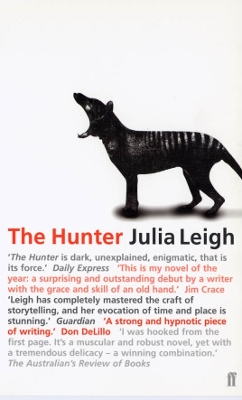Reviewed by Michael @ Knowledge Lost on
Julia Leigh, born in 1970 in Sydney, Australia, has received critical acclaim even though she has had a very small writing career so far. The Hunter in 1999; a novella in 2008, Disquiet; and then she wrote and directed the 2011 movie Sleeping Beauty (not to be confused with the fairy tale). I tend to think that most of her acclaim came from people expecting great things from her after she was selected to be the protégé of Pulitzer and Nobel Prize winning author Toni Morrison in 2002 as part of the Rolex Mentor and Protégé Arts international philanthropic programme.
The Hunter is an interesting novel because it follows a post colonial narrative which is unheard of for an Australian novel. When it comes to Australian adventure novels, most of the time characters just get lost in the wilderness not go hunting dangerous animals. This leads to an interesting portrayal of the thylacine, which I will look at later. The Hunter may be a stripped back quest narrative but it feels very American and masculine for an Australian female author. American in a sense that the hunt narrative could be compared to Moby Dick, Old Man and the Sea and even The Bear, comparisons which she has acknowledged. Masculine in the way she gives approaches this novel with detachment, contempt and control over the death hunt subject matter. You could compare the paired back minimalist prose to something found in hard-boiled fiction, but not quite.
M is the archetype of a hunter, a figure that inhabits the story rather than one the lives in its world. There are not too many details of this character, but he seems to have similar characteristics as the hero in a spaghetti western. Ruthless, cold, calculating and inhuman but never unethical; though the lack of character development is an important part of this book. It forces the reader to keep him at arm’s length so we can study him. It’s almost like Julia Leigh has been taking active steps so that we never warm to him.
He is never a role model or anti-hero; he is just a faceless man in pursuit of the last remaining thylacine. What does the thylacine represent in this book? Imagination, hope for the future, guilt of the past, living in harmony with nature or a biotech ghost in a Tasmanian gothic novel? It’s up to the reader to decide, but while we are on the subject of the thylacine, does this animal both represents the Australian wildlife, an animal going extinct to raise global awareness as a form of Ecocriticism or is it supposed to be an animal that could harm or kill the hunter? These are the questions that I believe Julia Leigh wants us to ask as readers.
Julia Leigh setups a situation where the reader has to reason with their imagination and emotions in order to get the reader to think about what the author might be saying. I really like how you can read The Hunter as an adventure, a Tasmanian gothic or as ecocriticism. No matter which way you read this you are not wrong. I thought of this more as a western; just with the way the protagonist was portrayed and the people drinking in the bar reminded me of those rednecks drinking in a saloon in those spaghetti western films. I’m interested to see how people read this book and just see what they got out of it.
The review originally appeared on my blog; http://literary-exploration.com/2013/05/28/book-review-the-hunter/
Reading updates
- Started reading
- 15 April, 2013: Finished reading
- 15 April, 2013: Reviewed
